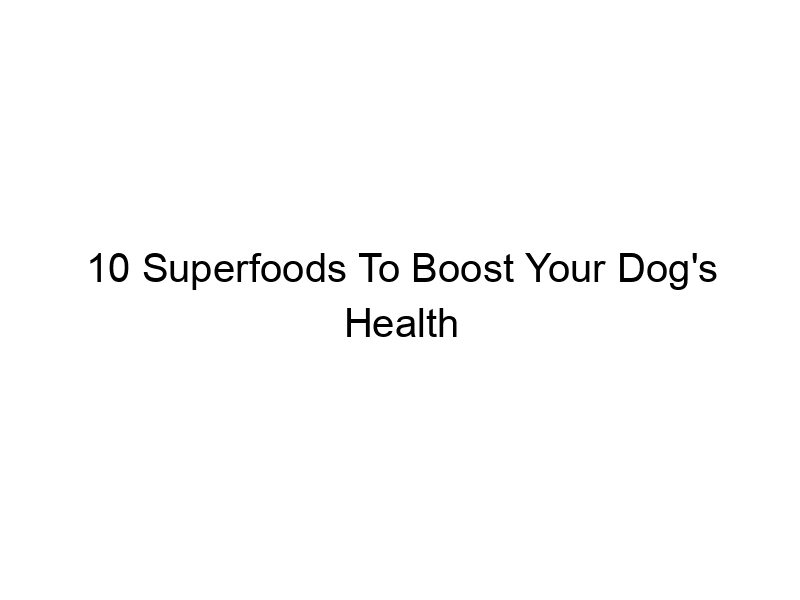Want to give your furry friend the best possible life? Nourishing them with the right food is key. This comprehensive guide explores 10 Superfoods You Should Be Feeding Your Dog, helping you understand their benefits and how to incorporate them into your dog’s diet safely and effectively. We’ll cover everything from the nutritional powerhouses they offer to practical tips for implementation, ensuring your canine companion thrives. Get ready to discover the secrets to a healthier, happier pup!
Dogs, like humans, require a balanced diet rich in protein, carbohydrates, fats, vitamins, and minerals. Protein is crucial for muscle building and repair, carbohydrates provide energy, fats support healthy skin and coat, while vitamins and minerals are essential for various bodily functions. Understanding these needs is the foundation for choosing superfoods that complement your dog’s regular diet.
The Importance of
a Balanced Diet
While superfoods offer incredible benefits, they shouldn’t replace a complete and balanced commercial dog food. Think of them as supplements, adding extra nutritional value to your dog’s daily meals. A sudden shift to a diet solely based on superfoods can lead to nutritional deficiencies. Always consult your veterinarian before making significant changes to your dog’s diet, especially if they have pre-existing health conditions.
Top 10 Superfoods for Dogs
1. Salmon: Omega-3 Fatty Acids for Healthy Skin and Coat
Salmon is a fantastic source of omega-3 fatty acids, particularly EPA and DHA. These fatty acids are crucial for maintaining healthy skin, a shiny coat, and reducing inflammation. They can also help with conditions like allergies and arthritis. Ensure you choose wild-caught salmon, as farmed salmon may contain higher levels of pollutants.
2. Blueberries: Antioxidant Powerhouses
These tiny berries are packed with antioxidants, which help protect cells from damage caused by free radicals. Blueberries are also a good source of fiber and vitamin C. They’re a delicious and healthy treat, but moderation is key, as they are high in sugar.
3. Sweet Potatoes: Vitamin A and Fiber Boost
Sweet potatoes are an excellent source of vitamin A, crucial for vision, immune function, and healthy skin. They also provide fiber, which aids in digestion and promotes a healthy gut microbiome. Always cook sweet potatoes before feeding them to your dog, as raw sweet potatoes can be difficult to digest.
4. Pumpkin (Plain): Digestive Aid and Fiber Source
Plain canned pumpkin (not pumpkin pie filling) is a fantastic source of fiber, promoting healthy digestion and preventing constipation. It’s also rich in vitamins and minerals. Start with small amounts and gradually increase the quantity as tolerated by your dog.
5. Greek Yogurt (Plain, Unsweetened): Probiotic Power
Plain, unsweetened Greek yogurt is a good source of probiotics, beneficial bacteria that support a healthy gut microbiome. This improves digestion and boosts immunity. Ensure it’s plain and unsweetened, as added sugars and flavors can be harmful to your dog.
6. Carrots: Vitamin A and Beta-Carotene
Carrots provide a good source of vitamin A and beta-carotene, a precursor to vitamin A. They are crunchy, enjoyable treats for dogs and support good eye health. Offer them in moderation, as they are relatively high in sugar compared to other vegetables.
7. Eggs: Protein and Essential Nutrients
Eggs are a complete protein source, providing all the essential amino acids your dog needs for muscle growth and repair. They also contain various vitamins and minerals. Always cook eggs thoroughly before feeding them to your dog to avoid the risk of salmonella.
8. Broccoli: Vitamins and Minerals
Broccoli is a nutritious vegetable packed with vitamins C and K, as well as fiber. It’s a good source of antioxidants. However, feed broccoli in moderation; large quantities can cause digestive upset in some dogs.
9. Apples (without core and seeds): Fiber and Antioxidants
Apples are a great source of fiber and antioxidants. They are also a delicious and healthy treat. However, always remove the core and seeds, as they contain cyanide compounds that are toxic to dogs.
10. Coconut Oil (virgin, unrefined): Healthy Fats and Coat Benefits
Virgin, unrefined coconut oil contains medium-chain triglycerides (MCTs), which can provide a quick source of energy and are easier for dogs to digest than other fats. It can also improve skin and coat health. Introduce coconut oil gradually to avoid digestive upset.
Incorporating Superfoods into Your Dog’s Diet
Gradual Introduction
When introducing any new food, do so gradually. Start with small amounts and monitor your dog for any adverse reactions, such as digestive upset or allergies. A slow introduction minimizes the risk of digestive issues.
Variety is Key
Offering a variety of superfoods ensures your dog receives a broad range of nutrients. Don’t rely on just one or two superfoods; instead, aim for a diverse selection.
Preparation Methods
Some superfoods need to be cooked before being fed to your dog (like sweet potatoes), while others can be given raw (like carrots). Always check the specific requirements for each superfood.
Portion Control
Superfoods should supplement, not replace, a complete and balanced dog food. Overfeeding can lead to weight gain and other health problems.
Monitoring Your Dog’s Response
Pay close attention to your dog’s bowel movements, energy levels, and overall health after introducing new superfoods. If you notice any negative changes, stop giving the food and consult your veterinarian.
Potential Limitations and Considerations
Allergies and Sensitivities
Dogs can have allergies or sensitivities to certain foods. Start with small amounts and watch for any signs of allergic reactions, such as itching, skin rashes, or vomiting. If any allergic reactions appear, consult your veterinarian immediately.
Individual Nutritional Needs
Each dog’s nutritional needs vary based on factors like age, breed, activity level, and health status. Consult with your veterinarian to determine the appropriate amount and types of superfoods for your dog.
Interaction with Medications
Some superfoods can interact with certain medications. If your dog takes any medication, consult your veterinarian before introducing new superfoods into their diet.
Frequently Asked Questions
What are the best ways to store superfoods for dogs?
Store superfoods properly to maintain their freshness and nutritional value. Fresh fruits and vegetables should be refrigerated and used within a few days. Canned pumpkin should be stored in the refrigerator after opening. Other superfoods, like coconut oil, can be stored at room temperature.
Can I give my dog too many superfoods?
Yes, it’s possible to overfeed your dog with superfoods. They should complement, not replace, a complete and balanced diet. Overfeeding can lead to weight gain and other health problems. Always follow recommended serving sizes and consult your veterinarian if you’re unsure.
My dog doesn’t like some of these superfoods. What should I do?
Some dogs are picky eaters. Try different preparation methods, such as mixing superfoods into their regular food or offering them as small, tasty treats. If your dog consistently refuses certain superfoods, don’t force them; focus on incorporating others they enjoy.
Are there any superfoods I should avoid giving my dog?
Yes, there are several foods that are toxic to dogs and should be strictly avoided, such as grapes, raisins, onions, garlic, chocolate, and xylitol (an artificial sweetener). Always research thoroughly before introducing any new food to your dog’s diet.
How often should I feed my dog superfoods?
The frequency depends on the superfood and your dog’s individual needs. Some can be given daily in small quantities, while others are best offered as occasional treats. Always consult your veterinarian for personalized guidance.
Final Thoughts
Incorporating these 10 superfoods into your dog’s diet can significantly contribute to their overall health and well-being. Remember, a balanced diet is key, and these superfoods act as beneficial additions, providing extra nutritional support. By understanding your dog’s individual needs and introducing these foods gradually and responsibly, you can help them live a longer, healthier, and happier life. Always consult your veterinarian before making significant dietary changes, especially if your dog has pre-existing health conditions. Remember to monitor your dog’s response to each new superfood and adjust accordingly. A happy and healthy dog is a testament to a caring and informed pet owner.
Start enriching your dog’s life today with these incredible superfoods. Their tail wags will be your reward!




